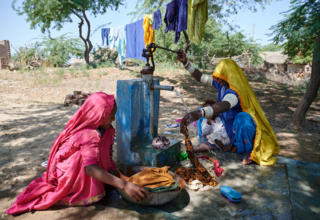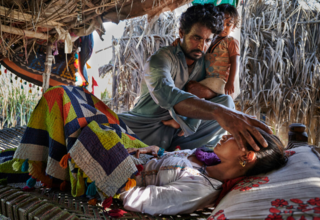Sexual and reproductive health services in humanitarian emergencies can often be neglected. Yet, in many areas of Pakistan where disasters and conflict persist, the needs are immense.
While Pakistan Global Risk Index ranking has significantly dropped from 6th in 2014 to 13th in 2017, the country remains vulnerable to natural disasters, including monsoon flooding, landslides, drought and earthquakes. The fragile security situation in Khyber Pakhtunkhwa (KP) and the Federally Administered Tribal Areas (FATA) regions remain a chronic humanitarian situation, significantly contributing to high unplanned pregnancies, maternal deaths and cases of gender-based violence in the country.
In times of crisis, one in every five women of reproductive age is likely to be pregnant. The capacity of health facilities, including skilled birth attendants and emergency obstetric care is often unavailable, which increases women's vulnerability. Complications that occur during pregnancy or childbirth are a leading cause of death and illness among women and young girls.
Humanitarian emergencies exacerbate other vulnerabilities, particularly among young girls and women, including risks of sexually transmitted infections, unintended pregnancies, rape, sexual exploitation and abuse.
UNFPA’s response in emergencies
UNFPA prioritizes the sexual and reproductive health needs of women and adolescent girls. This includes programmes that increases their access to sexual and reproductive health services and protects them from gender-based violence.
UNFPA works with government, civil society partners and other humanitarian agencies to coordinate the delivery of clean birthing kits, training of skilled birth attendants, referral support mechanisms for 24/7 emergency obstetric care; and community awareness campaigns on sexual and reproductive health and gender-based violence issues.
Supporting displaced peoples in northwest Pakistan
The majority of UNFPA’s humanitarian response efforts are concentrated in the northwest area of Pakistan, including KP and FATA. This region witnessed major population displacements as a consequence of security operations between government armed forces and non-state armed groups as well as sectarian violence. At the peak of the crisis in April - May 2009, nearly three million people were forced to flee their homes.
At the end of December 2014, the Government of Pakistan established a plan to facilitate the return of over 160,000 registered families (approximately 960,000 individuals) in two phases until the end of 2015 with an equal number planned for return in 2016. UNFPA, alongside with other humanitarian actors, support the sexual and reproductive health needs of the returnees.
Addressing gender-based violence
UNFPA co-led the Gender-Based Violence Area of Responsibility under the Global Protection Cluster. This coordination structure oversees the coordination of the humanitarian response to gender-based violence. UNFPA works with national and local health and disaster management authorities and civil society organizations to effectively design, manage and evaluate programmes that address gender-based violence and sexual and reproductive health needs.
With the support of UNFPA, three women-friendly spaces were established, equipped with skilled psychologists and female doctors to provide medical and psychosocial services. In addition, 450 personnel from government, international and national organizations and the Army were trained in sexual and reproductive health and rights, since 2013.
Disaster risk reduction
UNFPA supports the development and institutionalization of the Minimum Initial Service Package (MIISP), which ensures quality reproductive health in crisis scenarios. UNFPA has helped humanitarian actors, policymakers and donors implement this critical tool. It has been integrated into Pakistan’s national and subnational preparedness and contingency plans as well as implemented in all acute emergencies.


